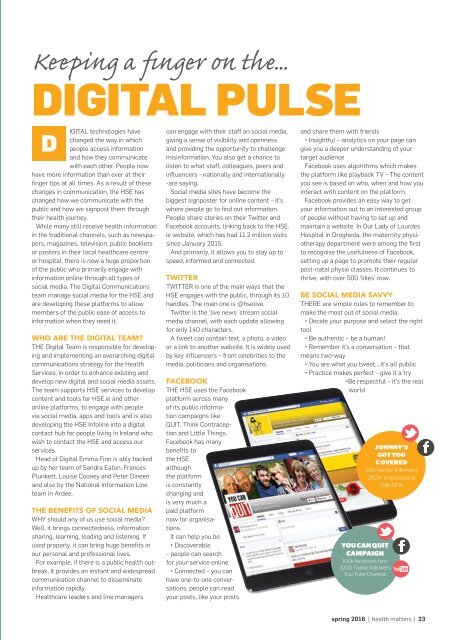caring Communication
HMspng16
HMspng16
Create successful ePaper yourself
Turn your PDF publications into a flip-book with our unique Google optimized e-Paper software.
Keeping a finger on the...<br />
DIGITAL pulse<br />
D<br />
igital technologies have<br />
changed the way in which<br />
people access information<br />
and how they communicate<br />
with each other. People now<br />
have more information than ever at their<br />
finger tips at all times. As a result of these<br />
changes in communication, the HSE has<br />
changed how we communicate with the<br />
public and how we signpost them through<br />
their health journey.<br />
While many still receive health information<br />
in the traditional channels, such as newspapers,<br />
magazines, television, public booklets<br />
or posters in their local healthcare centre<br />
or hospital, there is now a huge proportion<br />
of the public who primarily engage with<br />
information online through all types of<br />
social media. The Digital <strong>Communication</strong>s<br />
team manage social media for the HSE and<br />
are developing these platforms to allow<br />
members of the public ease of access to<br />
information when they need it.<br />
Who are the Digital Team?<br />
The Digital Team is responsible for developing<br />
and implementing an overarching digital<br />
communications strategy for the Health<br />
Services, in order to enhance existing and<br />
develop new digital and social media assets.<br />
The team supports HSE services to develop<br />
content and tools for HSE.ie and other<br />
online platforms, to engage with people<br />
via social media, apps and tools and is also<br />
developing the HSE Infoline into a digital<br />
contact hub for people living in Ireland who<br />
wish to contact the HSE and access our<br />
services.<br />
Head of Digital Emma Finn is ably backed<br />
up by her team of Sandra Eaton, Frances<br />
Plunkett, Louise Cooney and Peter Dineen<br />
and also by the National Information Line<br />
team in Ardee.<br />
The benefits of social media<br />
WHY should any of us use social media?<br />
Well, it brings connectedness, information<br />
sharing, learning, leading and listening. If<br />
used properly, it can bring huge benefits in<br />
our personal and professional lives.<br />
For example, if there is a public health outbreak,<br />
it provides an instant and widespread<br />
communication channel to disseminate<br />
information rapidly.<br />
Healthcare leaders and line managers<br />
can engage with their staff on social media,<br />
giving a sense of visibility and openness<br />
and providing the opportunity to challenge<br />
misinformation. You also get a chance to<br />
listen to what staff, colleagues, peers and<br />
influencers - nationally and internationally<br />
-are saying.<br />
Social media sites have become the<br />
biggest signposter for online content – it’s<br />
where people go to find out information.<br />
People share stories on their Twitter and<br />
Facebook accounts, linking back to the HSE.<br />
ie website, which has had 11.2 million visits<br />
since January 2015.<br />
And primarily, it allows you to stay up to<br />
speed, informed and connected.<br />
Twitter<br />
TWITTER is one of the main ways that the<br />
HSE engages with the public, through its 10<br />
handles. The main one is @hselive.<br />
Twitter is the ‘live news’ stream social<br />
media channel, with each update allowing<br />
for only 140 characters.<br />
A tweet can contain text, a photo, a video<br />
or a link to another website. It is widely used<br />
by key influencers – from celebrities to the<br />
media, politicians and organisations.<br />
Facebook<br />
The HSE uses the Facebook<br />
platform across many<br />
of its public information<br />
campaigns like<br />
QUIT, Think Contraception<br />
and Little Things.<br />
Facebook has many<br />
benefits to<br />
the HSE<br />
although<br />
the platform<br />
is constantly<br />
changing and<br />
is very much a<br />
paid platform<br />
now for organisations.<br />
It can help you be:<br />
• Discoverable<br />
– people can search<br />
for your service online<br />
• Connected – you can<br />
have one-to-one conversations,<br />
people can read<br />
your posts, like your posts<br />
and share them with friends<br />
• Insightful – analytics on your page can<br />
give you a deeper understanding of your<br />
target audience<br />
Facebook uses algorithms which makes<br />
the platform like playback TV – The content<br />
you see is based on who, when and how you<br />
interact with content on the platform.<br />
Facebook provides an easy way to get<br />
your information out to an interested group<br />
of people without having to set up and<br />
maintain a website. In Our Lady of Lourdes<br />
Hospital in Drogheda, the maternity physiotherapy<br />
department were among the first<br />
to recognise the usefulness of Facebook,<br />
setting up a page to promote their regular<br />
post-natal physio classes. It continues to<br />
thrive, with over 500 ‘likes’ now.<br />
Be social media savvy<br />
THERE are simple rules to remember to<br />
make the most out of social media.<br />
• Decide your purpose and select the right<br />
tool<br />
• Be authentic – be a human!<br />
• Remember it’s a conversation – that<br />
means two-way<br />
• You are what you tweet....it’s all public<br />
• Practice makes perfect – give it a try<br />
•Be respectful – it’s the real<br />
world<br />
spring 2016 | health matters | 33


